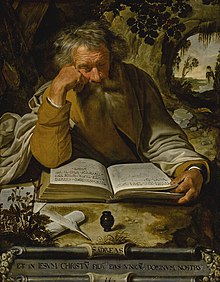St Andrew
| Andrew the Apostle | |
|---|---|

Saint Andrew the Apostle by Artus Wolffort
|
|
| Apostle | |
| Born | Early 1st century Galilee, Roman Empire |
| Died | Mid- to late 1st century Patras, Achaia, Roman Empire |
| Venerated in | All of Christianity |
| Canonized | Apostolic age by Pre-congregation |
| Major shrine | Duomo Cathedral in Amalfi, Italy, St Andrew's Cathedral, Patras, Greece; St Mary's Cathedral, Edinburgh, Scotland; the Church of St Andrew and St Albert, Warsaw, Poland. |
| Feast | 30 November |
| Attributes | Old man with long white hair and beard, holding the Gospel Book or scroll, sometimes leaning on a saltire, fishing net |
| Patronage | Scotland, Barbados, Georgia, Ukraine, Russia, Sicily, Greece, Cyprus, Romania, Patras, San Andrés (Tenerife), Diocese of Parañaque, Telhado Fundão, Amalfi, Luqa (Malta) and Prussia; Diocese of Victoria; fishermen, fishmongers and rope-makers, textile workers, singers, miners, pregnant women, butchers, farm workers, protection against sore throats, protection against convulsions, protection against fever, protection against whooping cough |
Andrew the Apostle (Greek: Ἀνδρέας, Andreas; from the early 1st century – mid to late 1st century AD), also known as Saint Andrew and called in the Orthodox tradition Prōtoklētos (Πρωτόκλητος) or the First-called, was a Christian Apostle and the brother of Saint Peter.
The name "Andrew" (Greek: manly, brave, from ἀνδρεία, Andreia, "manhood, valour"), like other Greek names, appears to have been common among the Jews, Christians, and other Hellenized people of Judea. No Hebrew or Aramaic name is recorded for him. According to Orthodox tradition, the apostolic successor to Saint Andrew is the Patriarch of Constantinople.
The New Testament states that Andrew was the brother of Simon Peter, and likewise a son of John, or Jonah. He was born in the village of Bethsaida on the Sea of Galilee. Both he and his brother Peter were fishermen by trade, hence the tradition that Jesus called them to be his disciples by saying that he will make them "fishers of men" (Greek: ἁλιεῖς ἀνθρώπων, halieis anthrōpōn). At the beginning of Jesus' public life, they were said to have occupied the same house at Capernaum.
...
Wikipedia
